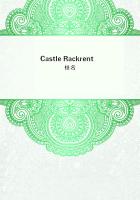"I know the good news, sir," she murmured.
"You have a good right to be first to know it," said Newman.
"You have taken such a friendly interest."Mrs.Bread turned away and began to blow the dust off the statue, as if this might be mockery.
"I suppose you want to congratulate me," said Newman.
"I am greatly obliged." And then he added, "You gave me much pleasure the other day."She turned around, apparently reassured."You are not to think that I have been told anything," she said; "I have only guessed.
But when I looked at you, as you came in, I was sure Ihad guessed aright."
"You are very sharp," said Newman."I am sure that in your quiet way you see everything.""I am not a fool, sir, thank God.I have guessed something else beside,"said Mrs.Bread.
"What's that?"
"I needn't tell you that, sir; I don't think you would believe it.
At any rate it wouldn't please you."
"Oh, tell me nothing but what will please me," laughed Newman.
"That is the way you began."
"Well, sir, I suppose you won't be vexed to hear that the sooner everything is over the better.""The sooner we are married, you mean? The better for me, certainly.""The better for every one."
"The better for you, perhaps.You know you are coming to live with us," said Newman.
"I'm extremely obliged to you, sir, but it is not of myself I was thinking.
I only wanted, if I might take the liberty, to recommend you to lose no time.""Whom are you afraid of?"
Mrs.Bread looked up the staircase and then down and then she looked at the undusted nymph, as if she possibly had sentient ears.
"I am afraid of every one," she said.
"What an uncomfortable state of mind!" said Newman.
"Does 'every one' wish to prevent my marriage?""I am afraid of already having said too much," Mrs.Bread replied.
"I won't take it back, but I won't say any more." And she took her way up the staircase again and led him into Madame de Cintre's salon.
Newman indulged in a brief and silent imprecation when he found that Madame de Cintre was not alone.With her sat her mother, and in the middle of the room stood young Madame de Bellegarde, in her bonnet and mantle.
The old marquise, who was leaning back in her chair with a hand clasping the knob of each arm, looked at him fixedly without moving.She seemed barely conscious of his greeting; she appeared to be musing intently.
Newman said to himself that her daughter had been announcing her engagement and that the old lady found the morsel hard to swallow.
But Madame de Cintre, as she gave him her hand gave him also a look by which she appeared to mean that he should understand something.
Was it a warning or a request? Did she wish to enjoin speech or silence?
He was puzzled, and young Madame de Bellegarde's pretty grin gave him no information.
"I have not told my mother," said Madame de Cintre abruptly, looking at him.
"Told me what?" demanded the marquise."You tell me too little;you should tell me everything."
"That is what I do," said Madame Urbain, with a little laugh.
"Let ME tell your mother," said Newman.
The old lady stared at him again, and then turned to her daughter.
"You are going to marry him?" she cried, softly.
"Oui ma mere," said Madame de Cintre.
"Your daughter has consented, to my great happiness," said Newman.
"And when was this arrangement made?" asked Madame de Bellegarde.
"I seem to be picking up the news by chance!""My suspense came to an end yesterday," said Newman.
"And how long was mine to have lasted?" said the marquise to her daughter.
She spoke without irritation; with a sort of cold, noble displeasure.
Madame de Cintre stood silent, with her eyes on the ground.
"It is over now," she said.
"Where is my son--where is Urbain?" asked the marquise.
"Send for your brother and inform him."
Young Madame de Bellegarde laid her hand on the bell-rope."He was to make some visits with me, and I was to go and knock--very softly, very softly--at the door of his study.But he can come to me!"She pulled the bell, and in a few moments Mrs.Bread appeared, with a face of calm inquiry.
"Send for your brother," said the old lady.
But Newman felt an irresistible impulse to speak, and to speak in a certain way."Tell the marquis we want him," he said to Mrs.Bread, who quietly retired.
Young Madame de Bellegarde went to her sister-in-law and embraced her.
Then she turned to Newman, with an intense smile."She is charming.
I congratulate you."
"I congratulate you, sir," said Madame de Bellegarde, with extreme solemnity.
"My daughter is an extraordinarily good woman.She may have faults, but I don't know them.""My mother does not often make jokes," said Madame de Cintre;"but when she does they are terrible."
"She is ravishing," the Marquise Urbain resumed, looking at her sister-in-law, with her head on one side.
"Yes, I congratulate you."
Madame de Cintre turned away, and, taking up a piece of tapestry, began to ply the needle.Some minutes of silence elapsed, which were interrupted by the arrival of M.de Bellegarde.
He came in with his hat in his hand, gloved, and was followed by his brother Valentin, who appeared to have just entered the house.
M.de Bellegarde looked around the circle and greeted Newman with his usual finely-measured courtesy.Valentin saluted his mother and his sisters, and, as he shook hands with Newman, gave him a glance of acute interrogation.
"Arrivez donc, messieurs!" cried young Madame de Bellegarde.
"We have great news for you."
"Speak to your brother, my daughter," said the old lady.
Madame de Cintre had been looking at her tapestry.
She raised her eyes to her brother."I have accepted Mr.Newman.""Your sister has consented," said Newman."You see after all, I knew what I was about.""I am charmed!" said M.de Bellegarde, with superior benignity.
"So am I," said Valentin to Newman."The marquis and Iare charmed.I can't marry, myself, but I can understand it.
I can't stand on my head, but I can applaud a clever acrobat.
My dear sister, I bless your union."
The marquis stood looking for a while into the crown of his hat.















